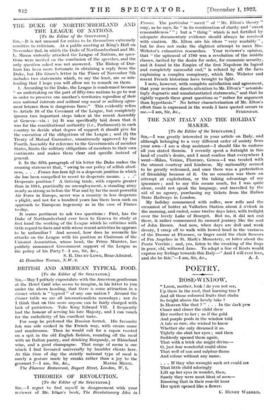THEORIES OF REVOLUTION.
[To the Editor of the SPECTATOR.] SIR,—I regret to find myself in disagreement with your reviewer of Mr. Elton's book, The Revolutionary Idea in France. The particular merit " of " Mr. Elton's theory " may, as he says, lie " in its combination of clarity and ' sweet reasonableness ' " ; but a " thing " which is not fortified by adequate documentary evidence should always be received with caution. Mr. Elton airs his ideas " very readably " but he does not make the slightest attempt to meet Mrs. Webster's exhaustive researches. Your reviewer's opinion, that " the upheaval of 1789 was a revolution of the middle classes, incited by the desire for order, for economic security, and it found in the Empire of the first Napoleon its logical and completely successful end," is refuted by all the facts explaining a complex conspiracy, which Mrs. Webster and recent French historians have brought to light.
I note, however, with complete satisfaction and agreement, that your reviewer directs attention to Mr. Elton's " astonish- ingly dogmatic and unsubstantiated statements," and that he rightly regards these great questions as " rather for argument than hypothesis." No better characterization of Mr. Elton's effort than is expressed in the words I have quoted occurs to


























































 Previous page
Previous page